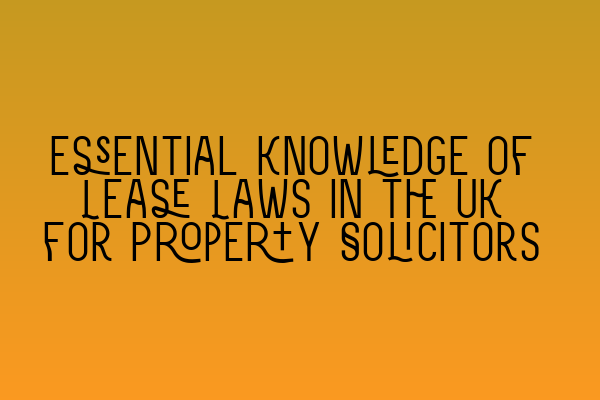Essential Knowledge of Lease Laws in the UK for Property Solicitors
As a property solicitor, having a strong understanding of lease laws in the UK is essential. Lease agreements are a fundamental aspect of property transactions, and being well-versed in the intricacies of lease law is crucial to providing effective legal services to your clients. In this blog post, we will explore the key areas of lease law that property solicitors must be familiar with, providing you with the essential knowledge to excel in your role.
1. Understanding the Basics of Lease Agreements
A lease agreement, also known as a tenancy agreement, is a legally binding contract between a landlord and a tenant. It outlines the rights and obligations of both parties and typically includes important details such as the duration of the lease, the rental amount, and any additional terms and conditions.
When reviewing lease agreements, it is important to pay close attention to the specific terms and clauses, as they can significantly impact the rights and responsibilities of the parties involved. Some common clauses that you should be familiar with include repair and maintenance obligations, rent review provisions, break clauses, and forfeiture clauses.
2. Identifying and Resolving Lease Disputes
Lease disputes can arise for various reasons, and as a property solicitor, it is your role to identify and resolve these disputes in a timely and efficient manner. Common areas of dispute include rent arrears, breaches of lease terms, disputes over service charges, and dilapidations.
To effectively handle lease disputes, it is important to have a sound understanding of the relevant legislation, case law, and precedents. Familiarize yourself with the Landlord and Tenant Act 1954, which governs the rights of tenants in commercial leases, and the Housing Act 1988, which regulates residential tenancies. Additionally, staying up to date with recent legal developments and court decisions will enable you to provide the best possible advice to your clients.
3. Advising on Lease Renewals and Extensions
Lease renewals and extensions often require careful negotiation and consideration of legal provisions. The Leasehold Reform, Housing, and Urban Development Act 1993 provide tenants with the right to extend their lease, subject to certain conditions. Understanding the intricacies of this legislation and its implications is crucial when advising clients on lease renewals and extensions.
When assisting clients with lease renewals, it is important to assess market conditions, consider potential rent reviews, and negotiate favorable terms on their behalf. Being well-versed in the statutory rights of tenants will ensure that you can provide accurate advice and representation throughout the renewal process.
4. Leasehold Enfranchisement
Leasehold enfranchisement refers to the process by which leaseholders acquire the freehold or extend their lease term. The Leasehold Reform Act 1967, the Leasehold Reform, Housing, and Urban Development Act 1993, and the Commonhold and Leasehold Reform Act 2002 govern various aspects of leasehold enfranchisement.
As a property solicitor, understanding the legislation surrounding leasehold enfranchisement is crucial when advising clients on their rights and options. Whether it involves collective enfranchisement, individual lease extensions, or the Right to Manage, having a comprehensive understanding of the legal framework will enable you to guide your clients through the process smoothly.
5. Commercial Leases
Commercial leases differ significantly from residential leases, and as a property solicitor, it is important to be well-versed in the nuances of commercial lease law. Considerations such as rent calculations, repairing obligations, break clauses, and rent reviews can greatly impact the commercial viability of a lease.
Familiarize yourself with the Landlord and Tenant Act 1954, which provides statutory protection for business tenants, as well as the principles established in case law, such as the decision in Street v Mountford. Keeping up to date with changes in legislation and understanding market trends will allow you to provide informed advice to your clients and negotiate favorable terms on their behalf.
Conclusion
Lease law is a complex and ever-evolving area of property law, and as a property solicitor, having a strong understanding of lease agreements, dispute resolution, lease renewals, leasehold enfranchisement, and commercial leases is essential. By equipping yourself with this essential knowledge, you will be better prepared to serve your clients and navigate the intricacies of lease law with ease.
If you are preparing for the SQE 1 or SQE 2 exams, we recommend checking out the related articles below for additional resources and courses:
– SQE 1 Practice Exam Questions
– SQE 1 Practice Mocks FLK1 FLK2
– SQE 2 Preparation Courses
– SQE 1 Preparation Courses
– SRA SQE Exam Dates
At SQE Property Law & Land Law, we offer comprehensive training and support for aspiring property solicitors. Contact us today to learn more about our courses and how we can help you excel in your legal career.
